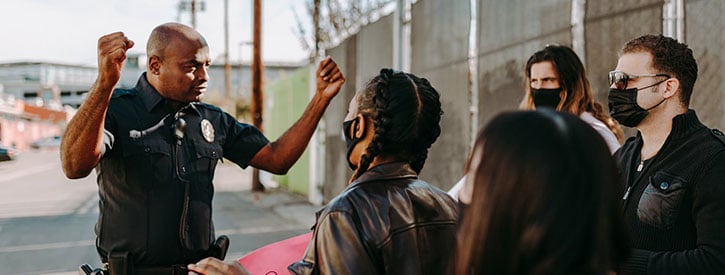
July 22, 2020
We all know and agree that Police officers have very difficult jobs. They are responsible for maintaining peace in their communities and they may have to take instant decisions in serious situations. Most of the police officers are dedicated to their job and are fair in handling the suspects.
But there are few officers who take law in their own hand. They may misuse their power, discriminate, use excessive force or use weapons in unwanted situations. It is important that you as a resident or citizen of the USA know your rights and options to deal with police brutality.
What is Police brutality? What are the different types of police brutality?
In California, law enforcement officers are permitted to use reasonable force for controlling a situation. However, they are not supposed to use unwarranted force or use weapons like taser or stun guns, batons, etc. barring in a few exceptional situations.
Many times because of inexperience or malice and hatred for certain communities or people from certain races, police officers use unwarranted and unnecessary force for controlling a situation. The term “police brutality” refers to various human rights violations by the police officers.
It may include unprovoked beatings, racial abuse, unauthorized killings, torture, or indiscrimination.
Different types of Police Brutality are:
- EXCESSIVE FORCE
Excessive force is the most common type of police brutality in the country. When police are required to catch or detain suspects or criminals who are armed or have a history of violence, they are permitted to use reasonable force.
However, a number of times police use excessive force even if not required. Beating with batons, using firearms or tasers, chokeholds etc. all come under excessive force. Use of this excessive force may result in serious injury or death. Police are allowed to use firearms only as a last resort.
- WRONGFUL SEARCH AND SEIZURE
The Fourth Amendment states that police or any law enforcement agency should have a “probable cause” to search a person or their property.
However, in a number of situations police conduct search and seize belongings even without having a valid warrant. This is not legal; it is called wrongful search and seizure.
- RACIAL DISCRIMINATION
Police and Law enforcement agencies are responsible for protecting all U.S. citizens and residents regardless of their race or colour.
Racial discrimination is a type of police brutality when people of a certain race or colour are wrongfully imprisoned or arrested or are victims of excessive force by the police.
A study by Stanford shows that police stop and search Afro-Americans or Hispanic motorists more as compared to the Whites.
- FALSE ARREST AND WRONGFUL IMPRISONMENT
False arrest or wrongful imprisonment is another type of police brutality. Arresting a person or taking into custody without an arrest warrant or probable is a false arrest. A false arrest violates federal civil rights laws and state common law.
The Fourth Amendment states that police can arrest individuals only if they have an arrest warrant issued by a judge. They are not permitted to detain anybody without a probable cause or evidence. If they fail to follow the guidelines, the police officer can be sued for a wrongful arrest.
- MALICIOUS PROSECUTION
Malicious prosecution can be claimed when a police officer starts a criminal proceeding against an individual without having proof that a crime was committed.
- DENIAL OF MEDICAL CARE
An individual in police custody may need medical assistance or attention. It is the duty of the police or law enforcement agency to provide the required medical care when the person is in their custody. Sometimes individuals are denied medical care by the police; this is a violation of the Eighth and Fourteenth Amendments and amounts to police brutality.
How do you file a complaint against Police Brutality?
If you are a victim of police brutality or have witnessed instances of unethical behaviour of the police, you can file a case against them. Below mentioned are the steps required for addressing police brutality and misconduct.
- Make an official note:
It is important to write down everything which you experienced or witnessed. Do it when the instance is still fresh in your memory.
Write everything in your own words explaining what happened actually, try remembering what was said to you and write down the exact words spoken. Make a note of the date, time, the specific location of the incident, names of witnesses and officers. Include only facts and write the truth.
- Get in touch with an experienced police brutality lawyer:
If you were falsely arrested or you were a victim of police misconduct, it is advisable to hire a professional police brutality lawyer who specialized in police misconduct cases.
A knowledgeable and experienced lawyer will study your case and help you understand whether the case is strong enough to be filed.
- File a misconduct or brutality report:
Do not proceed with filing the report unless all criminal charges have been resolved. Check with your local city administration and get information about the correct office. Few locations require a specific form to be filled out while filing a report.
If the form is not filled, the case can be automatically dismissed. Understand the whole process before going ahead. The process varies according to the city or jurisdiction. Maintain copies of the filed report.
How can a Good Police Brutality Lawyer help you?
A lawyer having experience in handling cases of Police brutality and Police misconduct can help the victim fight the injustice and protect their constitutional human rights.
The lawyer’s experience and knowledge about the law can help determine the right course of action for the victims so that they are not denied justice.
If you or your family member has been a victim of police brutality in Murrieta or its surrounding area, you can contact us at Khashan Law.
We are a highly experienced civil rights law firm who can represent you and help you fight your case against police brutality. We appreciate the services of the police force and salute their work.
However, we condemn false arrests and imprisonment, use of excessive force and firearms. Contact us today at 951.461.2387 for a free and confidential consultation with us.




